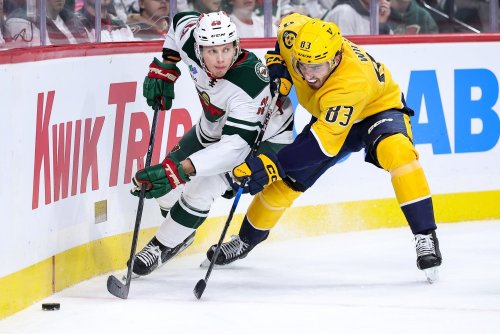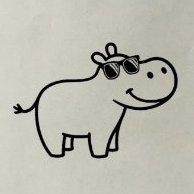
First: let's get this out of the way: this isn't an article about KG exclusively. Rather, but rather the reason he was (allegedly) called up: to make the Wild more physical. It was, according to some, a message from John Torchetti to the Wild that they needed to finish their checks, something Gabriel is supposed to be good at. I will refrain from mentioning at this point that in his 6:52 of ice time, Gabriel only recorded one hit. In fairness to Gabriel, 6:52 isn't much time, and as we will see the Wild are not a hard-hitting team.
The Wild are thought of as a "soft" team. They don't hit enough, they don't play physical enough, etc. While I have bemoaned as much as anyone the lack of a net-front presence, this is a different, more systemic issue. It is the contention of some that hits- particularly in the playoffs- don't matter.
Firstly, there are no stats to talk about battles along the board, establishing a net-front-presence, etc. The Wild do some of these things well sometimes, though this season they have struggled particularly with having someone at the goalmouth to shovel in the garbage.
While it would be great to sit down and lay out objectively that the Wild did this or that; we don't have that option. We can bandy stories and anecdotes about when Nino was or wasn't soft on the puck, but until someone sits down and tracks puck battles, positioning, etc, there's no way to objectively determine trends. The best we could do is look at scoring chances, which has already been done.
TL;DR: Hits and physicality aren't the same thing, but hits are the only measured metric we have on which to base this evaluation.
Secondly: let's be clear on something: for all his good-guy-ness, Kurtis Gabriel is not an effective hockey player at the NHL level. If he was, he would not be in the AHL with little hope of getting called up at almost 23 years old. In the AHL this year, Gabriel registered a mere .15 points per game, but over 2 PIM per game. He averaged less than one shot on goal per game as well (60 SOG in 66 games). He seems like a nice young man, and I am sure he works hard- this is anything but personal (and, as I said, the focus is not on him primarily).
On to the Numbers
As far as "finishing checks" we can absolutely track that. They are called hits, and they are just about the most subjective thing in hockey. Trackers are human and miss them, and it's been shown time and again that home teams tend to somehow register more hits than they do away from home- almost as though there was some bias in the trackers themselves.
Fortunately, we have a full season to work with, so that bias should have balanced out over the course of the season.
Chicago also tops the list for the most-hit team, at over 2300 hits absorbed. The Wild, on the other hand, are at 7th-least hit team in the league. So, while the Wild aren't laying people out, nor were they harassed physically all that much.
These numbers average out to: just over 16 hits given per game, and just over 19 received.
The Playoffs
Fascinating as all this might be, it tells us little about what's gone on in the playoffs so far. So, what's the story?
There are four possible conclusions from this data:
1) The data is wrong. The bias between home and away is too significant to make any determinations. This is possible... but the fact that the Stars and Wild were so close in their totals indicates that it's probably not the case.
2) Simply out-hitting the stars is the strategy to go with. That's entirely possible.... but game 2 was also closely contested, with the Wild having ample chances to win, and they were out-hit by the same margin they out-hit the Stars in game 3. It's unlikely at best that simply having 1 more hit than the Stars is going to flip the table the way it was for most of game 3 on Monday.
3) Hits simply don't matter; at least not in and of themselves. The determining factor of whether a team wins or loses has more to do with their passing, shot creation, and shot suppression than it does their hitting. In other words: hitting is a tool, but using that tool more or less does not inherently make you more or less likely to win.
4) The Wild are at their best when they focus less on playing a hard-hitting game and more on moving the puck quickly and controlling it well. While all of the above stats are true, they are also irrelevant. Far more important than the physical play the Wild may or may not have used is the fact that Monday was the first time in the series the Wild out-shot the Stars, as well as creating more and better chances (the Wild dominated shots, scoring chances, and high-danger scoring chances).
Think you could write a story like this? Hockey Wilderness wants you to develop your voice, find an audience, and we'll pay you to do it. Just fill out this form.







Recommended Comments
There are no comments to display.
Join the conversation
You can post now and register later. If you have an account, sign in now to post with your account.
Note: Your post will require moderator approval before it will be visible.